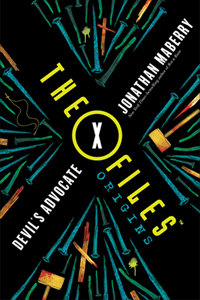Jonathan Maberry delivers an amazing Dana Scully story in “X-Files Origins: Devil’s Advocate” (2017) that not only shows what our favorite red-headed agent is like at age 15, but it’s also the best character piece about Scully, period. The author – who was previously the editor of the three short-story anthology books – builds from the conceit in episodes such as Season 1’s “Beyond the Sea” and Season 5’s “Emily” that Scully believes in God despite being the skeptic in the “believer-skeptic” dynamic with Mulder.
Weighing her options
In “Devil’s Advocate,” Dana is a sophomore in high school in Craiger, Md., having just moved with her naval family from San Diego. (The other 1979-set “Origins” book, “Agent of Chaos,” finds 17-year-old Mulder nearby in Washington, D.C. Mulder briefly visits Craiger in that book, and some supporting characters from the Beyond Beyond new-age shop cross over, but thankfully “Origins” doesn’t do the cheesy thing where the future partners almost meet.)
A more practical-minded person than Mulder, Dana is nonetheless not fully formed out of the womb by any means. She is working through what she wants to do for a career.

“X-Files Origins: Devil’s Advocate” (2017)
Author: Jonathan Maberry
Series: “Origins” No. 2
Genres: Science fiction, mystery
Indeed, her nightmares in “Devil’s Advocate” – something her new-agey sister, Melissa, is happy to help her work through – don’t push her toward “believer” status; rather, they make her cling to the scientific method. Dana is scared of the unexplained, but does not dismiss it out of hand.
Not an unbeliever
Maberry understands something that’s often misrepresented in casual analyses of “The X-Files”: Skeptic is not the opposite of believer. The opposite would be unbeliever, and Dana is not that. Whereas Mulder wants to believe, Scully rigidly follows the evidence, and only after eliminating rational explanations does she allow for the improbable or impossible.
When Scully’s belief in God was introduced into the “X-Files” back in the day, my gut reaction was that it was a cheap way to add a layer to her character, one that’s ultimately inconsistent. However, the more I think about it – and “Devil’s Advocate” encourages me to think about it, even if it stays out of the weeds of religion – Dana’s God-belief is her starting point in the same way another person’s atheism or agnosticism is their starting point.
Aside from the fact that she wears a Christian cross – which could be more out of family tradition than evangelical belief – Scully doesn’t regularly claim to understand the specific nature of God.
Gaining confidence
Granted, there’s more to dig into there, and broadly speaking, the notion that the skeptic is religious and the believer is an atheist remains a fascinating contradiction that makes us love Scully and Mulder all the more for being individual humans.

Speaking of which, Maberry nicely defines Scully’s traits beyond beliefs and professional interests in “Devil’s Advocate.” Whereas her older sister, Melissa, was caught kissing a boy at age 9, Dana lacks social confidence.
But science classmate Ethan has his eye on her, and we can understand why. The things Dana takes for granted – her smarts, her dedication to homework, her jujitsu skills (as basic as they may be) – are cool to Ethan. Maberry pens their first-romance in cute fashion, with Dana cursing the fact that redheads blush more fiercely. At various points, she imagines her cheeks turning the color of spotlights and lobsters.
A good mystery
“Devil’s Advocate” is a meaty mystery, too, with killings disguised as accidents, a mysterious drug in the victims’ systems, and a dash of students’ rights issues in regard to drug testing. Even the adult Dana wouldn’t piece the answers together quickly, so I found this novel to be more substantial than the YA-leaning “Agent of Chaos” – although I also liked that one.
Some might quibble with Maberry bringing the Syndicate into the picture for this seemingly minor case when Scully is only 15, but – aside from the remarkable breadth of their spying abilities in 1979 – the conspirators are effectively and believably used. In one particularly moody scene, the First Elder appears, and the author wonderfully portrays the strength and presence the man projects toward his cowed underlings.
“Devil’s Advocate” ultimately succeeds on both levels: as a creepy and dense X-File, and as a wonderful coming-of-age tale for Dana Scully.

